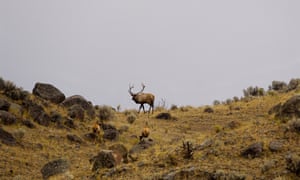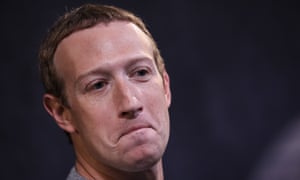Trump wants to put a rightwing zealot in charge of public land. Here's why it matters
William Perry Pendley, Trump’s nominee to lead the Bureau of Land Management, has ties to anti-environment and anti-government forces
Mon 6 Jul 2020 09.30 BST
 ‘Although Pendley has been acting director of the Bureau of Land Management since last July, his official nomination will give him troubling new authority and political clout.’ Photograph: georgesanker.com/Alamy Stock Photo
‘Although Pendley has been acting director of the Bureau of Land Management since last July, his official nomination will give him troubling new authority and political clout.’ Photograph: georgesanker.com/Alamy Stock Photo
O
n 26 June, Donald Trump announced that he plans to nominate William Perry Pendley to lead the Bureau of Land Management. That may not sound like big news, but it is. First of all, the office manages one-tenth of the United States’ land mass and, therefore, massive amounts of fossil fuels. Second, Pendley is linked to two little-known but very dangerous political movements: the so-called Wise Use movement and the anti-government extremists sometimes called constitutionalists or sovereign citizens.
The appointment should not come as a total surprise. Wise Use advocates, who are fiercely opposed to almost any environmental protection laws, have long had exceptional access to the Trump administration. In 2017, Lars Larson, a “journalist” from the alternative rightwing media sphere, crystallized the attitude of the Wise Use movement with a comment he made to then press secretary Sean Spicer:
The federal government is the biggest landlord in America. It owns two-thirds of a billion acres of America. I don’t think the Founders ever envisioned it that way. Does President Trump want to start returning the people’s land to the people? And in the meantime … can he tell the forest service to start logging our forests aggressively again to provide jobs for Americans, wealth for the treasury, and not spend $3.5bn a year fighting forest fires?
Larson was expressing a key demand of the Wise Use movement. The movement wants to privatize basically all public land, so that it can be used “wisely” by big business – especially the agricultural, fossil fuel and logging industries, which are also the movement’s biggest donors. The movement has been responsible for significant harassment and threats of political violence, particularly against environmentalists and employees of government agencies in the Pacific north-west. Between 2013 and 2018 alone, federal employees overseeing public lands were assaulted or threatened at least 360 times. In roughly the same period, the FBI initiated under 100 related domestic terrorism investigations, most concerning individuals motivated by anti-government ideologies.
The anti-environmentalists overlap with sections of the broader US far right, notably so-called constitutionalists and sovereign citizens, who hold a variety of different beliefs, all essentially denying the legitimacy of the federal government. This very loosely organized subculture has been responsible for some of the most notorious anti-government actions, including the 2014 Bundy Standoff in Nevada and the 2016 Oregon Standoff. The Oregon standoff, in which members of rightwing militia groups occupied the Malheur national wildlife refuge for 41 days to protest the sentencing of two ranchers for burning federal lands, became a cause celebre for many far-right activists.
Trump has long been sympathetic to these movements. In 2018 he pardoned Dwight Hammond Jr and his son, Steven Hammond, the two farmers whose case sparked the Oregon Standoff. But so far Trump’s support has been mainly symbolic and verbal. Like Jair Bolsonaro in Brazil, Trump has questioned federal ownership of public land on many occasions. In November 2018, as California was battling massive forest fires, he tweeted:
There is no reason for these massive, deadly and costly forest fires in California except that forest management is so poor. Billions of dollars are given each year, with so many lives lost, all because of gross mismanagement of the forests. Remedy now, or no more Fed payments!
Note the similarity to Larson’s demand a year earlier.
Although Pendley has been acting director of the Bureau of Land Management since last July, his official nomination will give him troubling new authority and political clout. In addition to undermining his own agency, he will also probably push to privatize more public land and provide even more access to exploitation by agricultural, fossil fuel and logging companies. Just last week, the Bureau of Land Management proposed opening millions of acres in rural Alaska for oil and gas leasing.
Just as troubling: Pendley’s new role will probably further embolden far-right anti-environment and anti-government forces, some of which already consider themselves above the law. In an op-ed last year in the Las Vegas Review-Journal, Pendley defended the role of Bureau of Land Management law enforcement officers, but did so in rhetoric carefully calculated to appease the anti-government far right, which believes local authorities are more legitimate than the federal government: “[Bureau of Land Management] rangers,” he wrote, “partner with local law enforcement, while recognizing that counties are a governmental-arm of sovereign states. Maintaining that deference is essential to making BLM a truly productive and valued partner to western communities.”
In articles for the conservative magazine National Review, Pendley has argued that the federal government should “sell its western lands” because “westerners are tired of having Uncle Sam for a landlord”, and expressed thinly-veiled support for anti-government extremists involved in armed stand-offs with federal agents.
The Pendley case is an important reminder that the ultimate far-right threat to American democracy does not come from the Klansmen or neo-Nazis shouting “Jews won’t replace us” in the streets of Charlottesville. It comes from broad but loosely organized anti-federal government subcultures, aided by men in suits fronting for multi-billion industries.
It is this coalition of disaffected, illiberal and self-interested forces that holds Trump and the Republican leadership together and which is slowly but steadily dismantling the federal government from within. It will not stop until every acre of public land is exploited by big business and federal oversight only exists on paper. It operates in broad daylight, aided by federal, state and local Republicans and ignored or underestimated by most Democrats.
- Cas Mudde is the Stanley Wade Shelton UGAF professor of international affairs at the University of Georgia, the author of The Far Right Today (2019), and host of the new podcast Radikaal
- https://www.theguardian.com/commentisfree/2020/jul/06/trump-public-land-pick-william-perry-pendley



